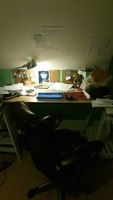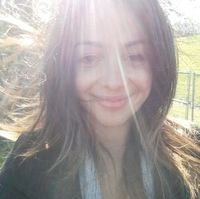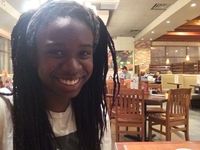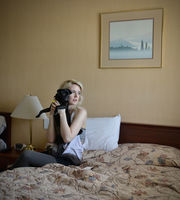Tiny Rooms of One's Own: Part 1 of Four New Writers to Watch - Faith Arkorful, Sofia Mostaghimi, Noor Naga, and Kristel Jax.
By Jess Taylor
As I developed my writing over the years, I had many teachers and people in the community support my work and offer me encouragement. It’s always been important for me to give back and encourage talent in emerging writers as I see it. It’s why I started the Emerging Writers Reading Series, and it will always be part of my writing life -- giving back support to those who gave it to me and to those that need it. I knew that for part of my Open Book posts, I wanted to feature some emerging writers who I think are doing really great work and will be writers to watch in the next few years. They are all going to explode!
Sofia Mostaghimi went to the same writing program as me, The University of Toronto’s MA in the Field of Creative Writing, and is one of two people that I trust to help effectively shape my work during the early messy birthing process. Many of my stories are indebted to her intelligence and great ear. Sofia also is the fiction curator of Emerging Writers now and works full-time as an English teacher at a French high school where she teaches grades 7-12, both in Applied and Academic English and Creative Writing. She’s working on a few projects, both novels and story collections.
Faith Arkorful was someone I came across while judging a fiction contest for Echolocation Magazine, a magazine I was co-editor of for Issue 13. Both my co-editor, Nadia Ragbar (another writer to watch), and I agreed that her work was so interesting and well developed -- we were shocked to find out she was still completing her undergrad. A few years later, Faith has read at Emerging Writers and Pivot Readings, has a some publications under her belt and a story coming out in the next issue of Little Brother. She currently in her final year of her undergraduate degree.
Noor Naga was actually in Dubai during our whole interview. She grew up there, and it’s where her novel project, which she is using for her thesis at The University of Toronto’s MA program, takes place. I got her to take photo evidence of herself working at the airport in Dubai as proof for our Open Book readers. Noor has done a few readings in the community and talked a bit with us about finishing her novel draft.
Kristel Jax works as a writer of non-fiction and is also a musician. I met her through a mutual friend of ours, Naben Ruthnum, who was recommending her fiction to me. So really, he’s the one that first put her on this list of great new writers that I keep in my head. I quickly booked her into Emerging Writers and was even more impressed after seeing her read. She also has a very cute pug that sleeps on her lap while she's writing.
I decided to interview all these writers together in a fluid style over G-Chat. The interview subjects were encouraged to respond to and build on each other’s ideas. I found that the result of this was that the chat was much less top-down than traditional interviews. When I’m interviewed, I often feel like I have to please to the interviewer, that they are in a position of authority, even if they don’t feel that way. Because I was outnumbered, that dynamic didn’t seem to happen and the answers were all very emotionally raw and honest, which I enjoyed. I hope you’ll like getting to know Faith, Noor, Sofia, and Kristel in the first half of our interview.
Jess: I think what I wanted to talk about first is where you see your writing fitting in literature and what your subject matter is or what your driving questions while writing are.
Noor: Ok, I'll go first. I grew up all over the place. One of the many third-culture kids hopping around the gulf and not belonging anywhere. The problem with growing up somewhere like Dubai is you end up speaking fluent English (probably losing whatever language your parents spoke), and studying only British and American Lit in school. You grow up without any literary representation of yourself. I found a lot of parallels in diasporic literature, of course, but being in between two places doesn't quite capture the experience of being rootless, belonging nowhere. There are a lot of us. I'm writing for us. So that the next generation won’t feel so alone. All of my fiction is about belonging or trying to belong.
Kristel: For fiction things, I think when I write I try to solve questions that I haven't found answers to in other writing, but or have but have some different ideas about how to answer. It's less about a story and more about feelings and emotional experiences, told through a situation. I'm going for a feeling of ambiguity because I like writing where it seems like many things can be true at once. I want things to be in question even if it's leading toward some kind of idea I'm trying to present. I have this understanding the world that is never constant, so I write as if I'm unsure even when I have some degree of confidence that I can speak to what the world is in a way that might benefit someone else. I don't know where that fits into literature but I mean, Virginia Woolf if she had wi-fi and just spent whole days watching sad Vlogs on Youtube.
Noor: I'm laughing at 21st century Virginia.
Your CanLit News
Subscribe to Open Book’s newsletter to get local book events, literary content, writing tips, and more in your inbox
Kristel: She'd be so addicted to Youtube.
Faith: I'm not sure where I see my work within a broader scale of literature - I'm still figuring it out! I do know, that on a very basic level, that I've always been interested in the way in which violence is commonplace, perhaps more normalized? I guess I'm interested in the ways that particularly women, have been taught to just deal with or accept these acts of violence upon themselves. Does that make sense? I feel like a downer immediately talking about violence! I swear I'm fun.
My favourite Vlog channels are the ones with like 50 subscribers where the person is just showing the most mundane things ever. I hate when they do pranks, like show me the shampoo you bought today.
Jess: Yeah, that makes sense, Faith. I think with writing, if we're doing a good job, we're going into those dark, uncomfortable places.
Would Virginia Woolf like the shampoo Vlog though, is the real question?
Noor: I've never seen her hair down.
Sofia: I write about characters that interest me, I guess, which is super vague. I like to write in voices that are not my own, or from perspectives that are not necessarily my own. My subject matter tends to be dark and to centre around people who are lonely or trying to make connections or trying to avoid connections.
Noor: (I feel you though Kristel... At least in regards to feeling like you can't speak with certainty about the world. I'm terrified of the third-person point of view for similar reasons. Too powerful or something.)
Kristel: Noor, like IRL is always uncertain, even before you bring other people into it's like, I have no idea why I'm doing most of the things I do. Pure terror. But I read a cool thing in the Atlantic about how people can actually believe two different things at once, and that's normal.
It was like the biggest relief ever.
Jess: Yeah most people have conflicting views, it makes people so interesting...and puzzling. Even ourselves. I'm often like, "WTH, I thought I believed X, how can I believe Y?"
Noor touched a bit on what drew her initially to writing... what about the rest of you? You have your subject matter, but when or why did you decide, Okay this is something I'm going to do and keep doing?
Noor: Kristel, Yes. It's like the opposite thoughts live in two separate rooms of the house, and they can live there for years without bumping into each other.
Kristel: Noor, YES, exactly. Ghosts in the night with yourself.
Oh god I was super tiny and I wanted to write books for adults? I dragged a school desk into my closet and had a lamp cord running under the door and that was my "study," and I mostly just made storyboards, to be honest, I never finished anything. I was better at thinking up characters and plots than writing. I got really into comics when I was a teenager (storyboards! cheating!) but then I got more serious about writing short stories and started doing zines after I saw other people doing it and realized people would read them.
Sofia: Kristel, a tiny Room of One's Own!!
I always loved writing and telling stories. When I was 12, I started writing this (terrible) novel called Street Game, about a girl named Foxy who leaves her gang leader/abusive boyfriend. I'd send the chapters out to all my friends by e-mail, and anyway, the story caught on, and they sent the chapters to their friends, who sent it to their friends. It was fun --- then in high school I started reading more advanced stuff and was so paralyzed by how awful my stuff was in comparison that I actually didn't write for years.
Kristel: Sofia, [I] definitely [did] the pass around thing between kids, except I think it was mostly comics with me. Also that story sounds like something I really want to read.
Noor: At age eleven, I burst into tears at the dinner table because it just hit me that JK Rowling's book idea was the best in the world and I couldn't top it, so my career as a writer was over. Dad still laughs at memory. Scars, real scars.
Sofia: Noor - can SO relate. I think I still feel that way after a good book... Kristel - if all else fails, there's a plan in the back of my mind to turn it into the next big TV series, haha.
Kristel: Noor, I felt that way about the book with the sandpaper cover, like fuck. Nothing else matters.
The book that ruins all other books.
Noor: I mourn with you, wallahi.
Jess: I think we can tell from all these stories that no one is more serious than prepubescent writer. Huge overwhelming failures, circulating material, setting up offices.
Faith: I think writing came pretty late for me. I had never really written anything until I was about fifteen.
Sofia: Faith - out of curiosity, what made you start at 15? Anything in particular?
Faith: We had this Toronto poet, Desi di Nardo come into my Grade Nine English class and she was like, to me, who had never read much poetry like "you know this stuff doesn't have to all rhyme, right?" And so I wrote mostly poetry and I always felt really good afterwards. I had never felt that way before, other than when I ran track.
It helped centre my mind.
Jess: I feel like writing is kinda like running track? Like I feel like it makes sense that someone who liked to run would also like to write. Because a lot of time it's competing against yourself.
Sofia: As an English teacher, I tell this to my students all the time and get the same reaction of shock and surprise.
Kristel: Faith, that's so cool, like "Hi, you can experiment things don't have to be boring," is so important for kids to hear.
Noor: I feel the same way about running, Faith. They're both meditative and solo.
Sofia: I started running after writing, and it's really helped with the kind of mental (and emotional) strain that comes with writing, so agreed.
Jess: I ran a bit in grade 8 to manage general life rage and I think it was the same time I started to write every day.
Maybe I write to also manage life rage.
Kristel: I definitely got a dog for the life rage.
Come back later for the second half of our interview where we'll be talking about Noor, Faith, Sofia, and Kristel's current projects, writing hangovers, and how to combat general sadness.
The views expressed in the Writer-in-Residence blogs are those held by the authors and do not necessarily reflect the views of Open Book: Toronto.
The views expressed in the Writer-in-Residence blogs are those held by the authors and do not necessarily reflect the views of Open Book.
Jess Taylor is a writer and poet based in Toronto, Ontario. She is the host and founder of the Emerging Writers Reading Series and is the fiction editor of Little Brother Magazine. Her work has been published in a variety of journals, magazines, and newspapers, including Little Fiction, Little Brother, This Magazine, The National Post, Emerge Literary Journal, Great Lakes Review, Zouch Magazine, and offSIDE Zine. Her pamphlet chapbook, And Then Everyone, was released by Picture Window Press in the spring of 2014. In October 2014, Anstruther Press released her first full-length chapbook, Never Stop. Recently, she was named “one of the best alt- lit reads coming out of Canada” by Dazed and Confused Magazine. She also received the Gold 2013 National Magazine Award in Fiction for her short story, “Paul.” Pauls is her first book (BookThug). Connect with Taylor at www.jesstaywriter.com, on Facebook (www.facebook.com/jesstaywriter), on Twitter @jesstaylorwriter, or on Tumblr (www.jesstaywriter.tumblr.com).








